
I’m listening to Edith Piaf as I’m writing this review, which is probably not a great idea. Arguably the best vocalist of the 20th Century, Piaf has such a distinctive, rousing style that it will prove difficult to differentiate the music from the biopic of Piaf’s life; the great songs from the frustrating film, as it were. It would be easy if I simply ranted about the film, which suffered from many missteps, but I’m not going to as I really quite liked it.
La Vie En Rose is the latest in sob-story musician biopics (Ray, Walk The Line) to lay itself bare across our screens. The musician in question must have had a life filled with melodramatic happenings, tortured love affairs, redemption and above all, great music. Edith Gassion had a natural foothold above Johnny Cash et all, as her life was almost unbelievably tragic in it’s emotional scope. She lived during one of the most turbulent times in modern history (France during WWII), her formative years were spent on the streets/in a brothel/with a travelling circus, her parents deserted her, the love of her life was killed in a plane crash, she herself was injured in a car accident, she suffered from crippling disability and arthritis, she had cancer and was accused of being both Nazi-sympathiser and a murderess. Oh and yes, she was also temporarily blind and deaf as a young girl. Any one of these misfortunes taken on their own would be enough to feel sorry for the woman, together, they add up to something Pedro Almodovar would reject as being too melodramatic. Personally, I feel that the amount of misery that the poor woman endured just cannot be properly executed in a 2 ½ hour film and unfortunately I was proved right - we are presented with scene upon scene of disaster, in a seemingly random order. With La Vie En Rose, screenwriter and director Olivier Dahan had an abundance of scenarios to choose to adapt for the big-screen and it feels like he just gorged on Piaf’s life without any semblence of thought to coherent storytelling or audience understanding. Characters appear and leave without leaving enough time for us to really know them or figure out the role they play in Piaf’s life. Her best friend, Momone, is given a good bit of screen time and her character is interesting (not to mention well-played), but the non-linear storyline jumps around so much that her own plotline makes little sense and we never get to experience their longtime friendship in a satisfying way. Scenes of the singer as a spry twenty-year old, running around Paris in a joyously exuberant manner are intersected with Piaf as an incredibly shrivelled woman, bitter and drugged-up in a nursing home. This results in disorientating and distressing the viewer, as we are never fully sure where we are, and for the multitudes of viewers who are not extremely well-versed in her life (myself included) it leaves us frustrated and wanting more.

This is my biggest quibble with the film and if it weren’t for it, La Vie En Rose would be one of the best films of the year. As it happens, the only thing to do is sit back and enjoy everything else that the film throws at you; which luckily includes wonderful performances, gorgeous costumes and lighting, and an infectious spirit. The early scenes set in the dingy streets of pre-war Paris are especially notable for their unbridled grubbiness (good thing Smell-o-vision never really took off as an idea in cinemas) and any of the scenes in the nightclubs exude a dirty bohemian glamour that is very appealing to watch. The costumes, sets and lighting give off a reality based quality that is never uncinematic and you feel that real care has been put into this world. The music is, obviously, fantastic - having Marion Cotillard lipsynch to Edith Piaf’s actual recordings help to add authenticity and will hopefully introduce the music to a younger audience (although I guess a large bulk of this film’s ticket-buyers will already be seasoned Piaf fans). Whether it’s the beginning of her singing career when she is still perfecting her technique and bellowing out racous tunes on street corners or that final triumphant rendition of “Non, Je Ne Regrette Rien” (I was anxiously waiting for that one song throughout the entire film, sticking it at the very end was a good move), Piaf’s voice speaks for itself. The melody of “La Vie En Rose” subtly plays around the corner of scenes all through the story, thankfully adding some sense of continuity and reminding us that, despite it’s flaws, this is a film about one woman and her emotional life through which she prevailed.
 Finally we come to the acting, and it must be said that Marion Cotillard throws herself into the role feet first and is an absoulte revalation. I mistakenly thought it was the first thing I’d ever seen her in, but IMBD tells me otherwise; she was also in Big Fish, Jeux d’Enfants and A Very Long Engagement, all of which I’d seen. It’s a shock to me, I still can’t equate the pretty, straightforward actress of these films (I had her down as an cheap Audrey Tatou for a while!) with this woman onscreen. Her CV includes a scattering of English language productions aswell as lots of French ones but her embodiment of Piaf is sure to catapult her into international fame. If she doesn’t garner an Acadamy Award for it, it’s just another indication of the Acadamy’s inherent xenophobia - and you can quote me on that.
Finally we come to the acting, and it must be said that Marion Cotillard throws herself into the role feet first and is an absoulte revalation. I mistakenly thought it was the first thing I’d ever seen her in, but IMBD tells me otherwise; she was also in Big Fish, Jeux d’Enfants and A Very Long Engagement, all of which I’d seen. It’s a shock to me, I still can’t equate the pretty, straightforward actress of these films (I had her down as an cheap Audrey Tatou for a while!) with this woman onscreen. Her CV includes a scattering of English language productions aswell as lots of French ones but her embodiment of Piaf is sure to catapult her into international fame. If she doesn’t garner an Acadamy Award for it, it’s just another indication of the Acadamy’s inherent xenophobia - and you can quote me on that.A large part of her role has to do with make-up and prosthetics, a succession of wigs and toothy mouthpieces that could envelop a lesser actress but Cotillard takes all these extras and runs with them. It’s a magical blend of the absurdly physical (she has perfected not only Piaf’s token stage actions with the outstretched arms and gaze directed upwards, but her hobbled walk, the clownish downturn of her mouth, her sudden outbursts of violence) and the emotional (her Piaf has an enormous sense of fun and mischief, along with a cruel steak and a steely determination). Pushed onstage and told to sing, the young Piaf receives a standing ovation and looks simultaneously overwhelmed, delighted, proud and perplexed. There’s a touching awkwardness about her and I couldn’t help but warm to her and root for her, even when she was being difficult. Cotillard literally throws herself into this role, she staggers around in a slapstick fashion a lot but there’s real emotion and fear and love mixed in. There were certain points where I found her very difficult to watch, she allows herself to be extremely physically unattractive and at times frightening. This film could be smacked with a label warning for parents; this film is emotionally draining. Piaf may have been only 47 when she died, but her body was riddled with disease that she looked like a very eldery woman, and Cotillard effortlessly captures the withered body as well as the young woman of a few scenes previously. It is a fine, brave, respectful performance and I heartily endorse it.
 All the supporting cast are strong although they are given too little to work with. Gerard Depardieu’s character is fun (I was literally dreading his arrival as I usually find him annoying, but he reigned it in a lot) and I was sorry to see his departure, Emmanuelle Seigner turns in a small but memorable role as Titine, the prostitute who mothers the child Edith and there’s a delightful part where Marlene Dietrich turns up (not the real Marlene obviously , due to her being dead, but one played by Caroline Sihol). I’ve already mentioned Piaf’s longtime friend Momone, played by Sylvie Testud, and my frustration that we didn’t learn more about her. Testud does an admirable job with limited source material and if a pivotal scene where Piaf dismisses her longest companion falls a little flat, it has absolutely nothing to do with the quality of acting on either part.
All the supporting cast are strong although they are given too little to work with. Gerard Depardieu’s character is fun (I was literally dreading his arrival as I usually find him annoying, but he reigned it in a lot) and I was sorry to see his departure, Emmanuelle Seigner turns in a small but memorable role as Titine, the prostitute who mothers the child Edith and there’s a delightful part where Marlene Dietrich turns up (not the real Marlene obviously , due to her being dead, but one played by Caroline Sihol). I’ve already mentioned Piaf’s longtime friend Momone, played by Sylvie Testud, and my frustration that we didn’t learn more about her. Testud does an admirable job with limited source material and if a pivotal scene where Piaf dismisses her longest companion falls a little flat, it has absolutely nothing to do with the quality of acting on either part.Reading the reviews afterwards (almost uniformly terrible, save for Roger Ebert who gave it an impressive four stars) I’m tempted to just go along with them altogether and say that the skewed chronology ruined what could have been a perfectly good film. I don’t disagree with this viewpoint, I was very confused by the sequencing at times, but I’m going to stick with what I felt in the cinema though, which was awe and delight. Yes, La Vie En Rose frustrated me, but it was also dazzling, beautiful and emotional. It will provoke a reaction whether you love or hate it - this is a troubled, inspired tribute to a troubled, inspired life.



No comments:
Post a Comment